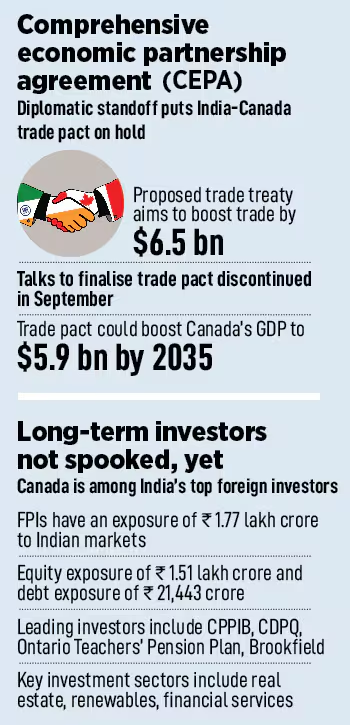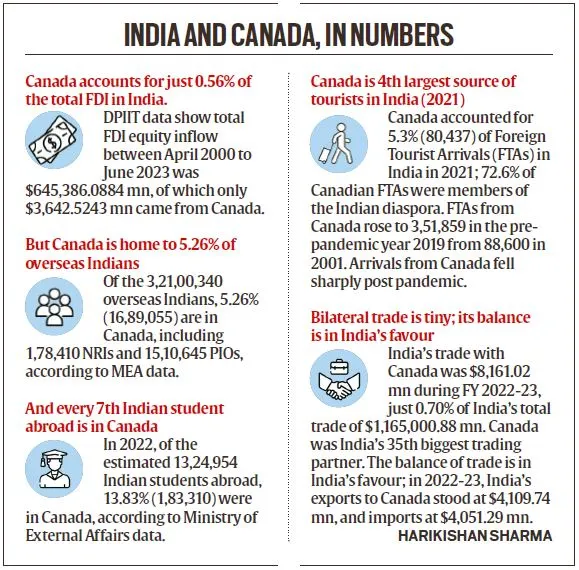International Relations
India - Canada Relations
- 18 Oct 2024
- 12 min read
For Prelims: Comprehensive Economic Partnership Agreement (CEPA), Commonwealth, G20, Space Collaborations
For Mains: Bilateral Relations, India-Canada, Trade Pacts and Agreements, Multilateral Institutions, Security and Growth.
Why in News?
Recently, India-Canada relations have faced serious setbacks following allegations of Indian involvement in the killing of a Khalistani leader in Canada.
What are the Recent Developments in India-Canada Relations?
- Assassination of Nijjar: The assassination of Hardeep Singh Nijjar, a Khalistani leader, in British Columbia has led to accusations from the Canadian Prime Minister that Indian officials were involved, which India has categorically denied as "absurd."
- Diplomatic Fallout: Diplomatic relations have deteriorated sharply, with both countries expelling each other’s diplomats and froze consular services.
- Support from Five Eyes Alliance: Canada has enlisted the Five Eyes intelligence alliance to gain international support amid rising diplomatic tensions with India over serious allegations.
What is the Five Eyes Alliance?
- About:
- The Five Eyes is an intelligence alliance comprising nations including Australia, Canada, New Zealand, the United Kingdom and the US.
- These countries are parties to the multilateral UK-USA Agreement, a treaty for joint cooperation in signals intelligence.
- Features:
- These partner nations exchange a wide spectrum of intelligence within one of the world's most tightly-knit multilateral agreements as part of the collaboration.
- Following its origin, the agency later enlarged its core group to ‘Nine Eyes’ and 14 Eyes alliances as well, encompassing more countries as security partners.
- The ‘Nine Eyes’ group expands to cover the Netherlands, Denmark, France and Norway, whereas the 14 Eyes bloc further includes Belgium, Italy, Germany, Spain and Sweden.
What are the Significant Areas of India-Canada Relationship?
- Political Relations:
- India and Canada established diplomatic relations in 1947. Both nations uphold democratic values, human rights, rule of law, and pluralism, forming a foundation for their bilateral interactions.
- Both countries collaborate in international forums such as the Commonwealth, G20, and United Nations, addressing global issues like climate change, security, and sustainable development.
- Economic Cooperation:
- Total bilateral trade in goods between India and Canada was worth USD 9.36 billion in 2023, with Canada being the 18th largest foreign investor in India, with investments of around USD 3.3 billion from April 2000 to March 2023.
- Ongoing negotiations for a Comprehensive Economic Partnership Agreement (CEPA) aim to enhance economic relations by covering trade in goods, services, investment, and trade facilitation.
- Diaspora Connections:
- Canada is home to over 1.8 million people of Indian origin, including approximately 1 million Non-Resident Indians (NRIs), making it one of the largest Indian diasporas globally.
- The diaspora significantly contributes to cultural exchange, economic activities, and bilateral relations, fostering strong social and familial ties between the two nations.
- Education and Space Innovation:
- Joint research initiatives in healthcare, agricultural biotechnology, and waste management are being advanced through programs like IC-IMPACTS, promoting innovation.
- Space collaboration includes agreements between ISRO and the Canadian Space Agency, with successful launches of Canadian satellites by ISRO.
- Education exchange is significant, with Indian students comprising around 40% of Canada’s international student population, enhancing cultural diversity.
- A Nuclear Cooperation Agreement signed in 2010, effective since 2013, allows uranium supply and establishes a Joint Committee for oversight.
- Strategic Importance:
- India plays a crucial role in Canada's Indo-Pacific strategy, aiding in the diversification of the Canadian economy and enhancing regional security dynamics.
- Collaboration on maritime security, counter-terrorism, and maintaining regional stability in the Indo-Pacific region.
Note:
What is the Comprehensive Economic Partnership Agreement (CEPA)?
- It is a kind of free trade pact that covers negotiation on the trade in services and investment, and other areas of economic partnership.
- It may even consider negotiation in areas such as trade facilitation and customs cooperation, competition, and IPR.
- Partnership agreements or cooperation agreements are more comprehensive than Free Trade Agreements.
- CEPA also looks into the regulatory aspect of trade and encompasses an agreement covering the regulatory issues.
What are the Major Challenges in India-Canada Relations?
- Diplomatic Immunity Issue:
- Canada has invoked the Vienna Conventions, emphasizing the need to protect its diplomatic staff and citizens in India amid heightened tensions.
- India's response to these concerns, along with its adherence to diplomatic norms, will play a crucial role in shaping the future of bilateral relations.
- Khalistan Issue:
- India perceives Canada’s tolerance of Khalistani separatist groups as a direct threat to its territorial integrity.
- Canada's investigation into alleged Indian involvement in the assassination of Hardeep Singh Nijjar, a prominent Khalistan supporter, has further escalated tensions. This ongoing issue continues to strain diplomatic and political trust between the two nations.
- Economic and Trade Barriers:
- Amid the growing political rift, efforts to finalize the Comprehensive Economic Partnership Agreement (CEPA) has stalled.
- Bilateral trade has slowed, and Canadian investments in India have faced uncertainty due to the diplomatic crisis.
- Visa and Immigration Issues:
- Due to a reduction in Canadian diplomatic staff in India, Indians applying for visas are facing significant delays. This has implications for new applicants, particularly students seeking to enroll in Canadian institutions.
- Geopolitical Implications:
- The India-Canada diplomatic standoff may harm India's G20 reputation if allegations are substantiated, affecting relations with nations linked to both countries.
- Canada’s G7 membership and ties with the Five Eyes alliance complicate the situation for strategic partners of India, including the US, UK, Australia, and Japan.
- Canada’s Indo-Pacific strategy, once focused on engaging India, is now facing hurdles due to these political tensions, limiting cooperation on security and economic issues in the region.
What is the Vienna Convention on Diplomatic Immunity ?
- Vienna Conventions:
- The Vienna Convention on Diplomatic Relations (1961) establishes the framework for diplomatic relations between independent countries. It outlines the rights and responsibilities of diplomatic missions and their personnel.
- The Vienna Convention on Consular Relations (1963) governs the functions of consular officers and the treatment of foreign nationals.
- Key Provisions:
- Diplomatic Immunity: Diplomats are granted immunity from arrest and detention, protecting them from legal processes in the host country.
- Inviolability of Diplomatic Premises: Diplomatic missions cannot be entered without permission, ensuring the safety and confidentiality of communications.
- Protection of Consular Officers: The conventions ensure that consular officers can perform their duties without interference, providing assistance to their nationals abroad.
Way Forward
- Address Khalistan Issue:
- Active dialogue is needed between both governments to resolve concerns related to the indian diaspora and Khalistan separatism. Respect for each other’s sovereignty and legal frameworks is crucial in resolving these sensitive issues.
- Strengthen Economic Ties:
- Revival of the Comprehensive Economic Partnership Agreement (CEPA) focusing on technology, renewable energy, and infrastructure.
- Strengthening trade and investment frameworks to create mutually beneficial opportunities.
- Balance Geopolitical Interests:
- Both nations need to carefully balance their relationships with major powers like the United States, China, and Russia.
- A cautious approach is required to navigate these dynamics and enhance strategic partnerships without conflicts.
- Leverage Multilateral Forums:
- Utilize multilateral platforms like G7, Five Eyes to address global challenges and promote shared values, contributing to the strengthening of bilateral ties.
|
Drishti Mains Question: Discuss the factors contributing to the decline in India-Canada relations, particularly in the context of the Sikh diaspora and Khalistani separatism. How can both nations work towards improving their bilateral ties? |
UPSC Civil Services Examination, Previous Year Question (PYQ)
Prelims
Q. Consider the following statements with regard to the G7:
- The G7 is a formal grouping of leading industrialised nations.
- The European Union has been part of all working sessions of the G7 since the 1981 Ottawa Summit.
- The Group of Eight was constituted in 1998 as Russia became a member of the grouping.
How many of the statements given above are correct?
(a) Only one
(b) Only two
(c) All three
(d) None
Ans: (b)
Q. In which one of the following groups are all the four countries members of G20? (2020)
(a) Argentina, Mexico, South Africa and Turkey
(b) Australia, Canada, Malaysia and New Zealand
(c) Brazil, Iran, Saudi Arabia and Vietnam
(d) Indonesia, Japan, Singapore and South Korea
Ans: (a)








